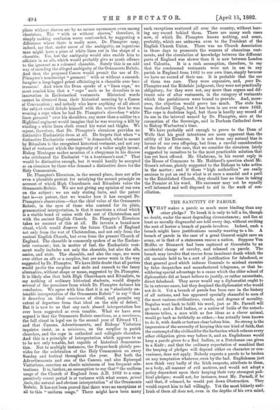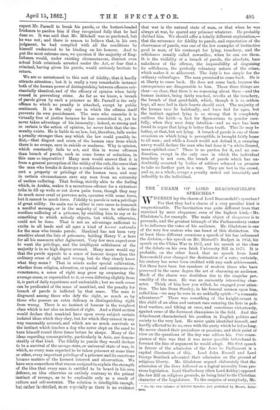THE SANCTITY OF PAROLE.
WHAT makes a parole so much more binding than any other pledge P To break it is only to tell a lie, though no doubt, under the most degrading circumstances ; and lies at least as morally disgraceful are told every day, without exciting the sort of horror a breach of parole involves. Indeed, such a breach might have justifications usually wanting to a lie. A breach of parole in the case of a great General might save an army, or in that of a statesman rescue a nation. Suppose Von Moltke or Bismarck had been captured at Gravelotte by an accidental charge of cavalry, and released on parole. The breach may involve that rescue from imminent death which the old casuists held to be a sort of justification for falsehood, or that general good which induces Generals to mislead enemies by false despatches and manufactured telegrams, or that be- wildering special advantage to a cause which the elder school of diplomatists did at heart believe to justify, or rather necessitate, direct falsehood. They never would say a diplomatist ought to lie in extreme cases, but they despised the diplomatist who would not do it. Yet a breach of parole has been rare in the history of all nations, and has appeared specially shameful to men of the most various civilisations, creeds, and degrees of morality. Regulus went back to fulfil his word, just as Mr. Parnell will go back ; and a Red Indian, or a native of India of the autoch- thonous tribes, a man with as few ideas as a clever animal, would go back as faithfully as either,—has actually been known to do it, with death or torture clear before him. So strong is the impression of the necessity of keeping this one kind of faith, that the contempt of the civilised for the barbarian which relaxes every other obligation gives way before it, and an Englishman would keep a parole given to a Red Indian, or a Dutchman one given to a Kafir ; and that the ordinary expectation of mankind that the keeping of pledges will depend either on character or con- venience, does not apply. Nobody expects a parole to be broken on any temptation whatever, even by the bad. Englishmen just now think very badly of the Irish suspects, attribute to them, as a body, all manner of evil motives, and would not adopt a policy dependent upon their keeping their very strongest poli- tical pledges; would not, for instance, trust Mr. Parnell, if he said that, if released, he would put down Obstruction. They would expect him to fail willingly. Yet the most bitterly anti- Irish of them all does not, even in the depths of his own mind,
expect Mr. Parnell to break his parole, or the hottest-headed Irishmen to pardon him if they recognised fully that he had done so. It was said that Mr. Mitchell was so pardoned, but he was not; and there is reason to believe that, in his own judgment, he had complied with all the conditions he himself understood to be binding on his honour. And to put the most extreme case, we question if the majority of Eng- lishmen would, under existing circumstances, distrust even actual Irish criminals arrested under the Act, or fear that a criminal, having given his parole, would seriously hesitate to return.
We are so accustomed to this sort of fidelity, that it hardly attracts attention ; but it is really a very remarkable instance both of the human power of distinguishing between offences sub- stantially identical, and of the efficacy of opinion when fairly roused in preventing crime. As far as we know, a breach of parole given by such a prisoner as Mr. Parnell is the only offence to which no penalty is attached, except by public sentiment. It is the only one in which the offence itself prevents its own punishment. The man who commits it is virtually free of justice because he has committed it, yet he never takes advantage of his immunity ; indeed, so strong and so certain is the action of opinion, he never feels that the im- munity exists. He is liable to no law, but, therefore, falls under a penalty stronger than any which the law could possibly in- flick—that disgust and scorn of the human race from which there is no escape, save in suicide or madness. Why is opinion, which constantly fails to act, and this in worse offences than breach of parole, such as some forms of seduction, in this case so imperative Many men would answer that it is from a general perception of the utility of the rule, the sense that the man who breaks it destroys a confidence which is in some sort a property or privilege of the human race, and may in certain circumstances save any man from an extremity of useless suffering. That feeling, strictly akin to the feeling which, in Arabia, makes it a monstrous offence for a victorious tribe to fill up wells or cut down palm trees, though they may do much more cruel or perverse acts, operates with some force, but it cannot be much force. Fidelity to parole is not a privilege of great utility. Its main use is either in rare cases to transmit a needful message, or in the majority of cases to relieve the needless suffering of a prisoner, by enabling him to say or do something to which nobody objects, but which, otherwise, could not be done. That is not an advantage sufficient to excite in all lands and all ages a kind of horror naturalis for the man who breaks parole. Mankind has not been very sensitive about the fate of prisoners, holding Henry V. a hero for all his massacre after Agincourt.. Very few men expect ever to want the privilege, and the intelligent selfishness of the majority is in no high degree aroused. Many more would say that the parole appeals to a sense of honour deeper than the ordinary sense of right and wrong, but do they clearly know what they mean ? That in minds under special cultivation, whether from religion, education, or special and continuous cir- cumstances, a sense of right may grow up surpassing the average sense, or superadded to it, or even differing slightly from it, is part of daily experience and undeniable ; but no such sense can be predicated of the mass of mankind, and the penalty for breach of parole is inflicted by that mass. The man is disgraced among those who defy the right, as much as by those who possess an extra delicacy in distinguishing right from wrong. There is no instinct of honour in the roughest class which is not also an instinct of right. And a third section would declare that mankind have upon every subject certain isolated ideas which they obey, but for which they cannot in any way reasonably account, and which are as much survivals as the instinct which teaches a dog who never slept on the sand to turn himself round three times before he sleeps. Many of the ideas regarding consanguinity, particularly in Asia, are demon- strably of that kind. The fidelity to parole they would declare to be a survival of the savage state, or universal state of war, in which, as every man expected to be taken prisoner at some time or other, every important privilege of a prisoner and its sanctions became matters of the keenest interest and observation. We have seen somewhere that reason assigned to explain the strength of the idea that every man is entitled to be heard in his own defence, an idea otherwise so entirely contrary to the primal instinct of revenge, as to be explicable only a.s a result of culture and self-restraint. The solution is intelligible enough, but rather far-fetched, more eTzcially as there is no evidence that war is the natural state of man, or that when he was always at war, he spared any prisoner whatever. He probably clubbed him. We should offer a totally different explanation,— that the reverence for fidelity to parole, and expectation of the observance of parole, was one of the few examples of instinctive good in man, of his contempt for lying, treachery, and the selfishness usually called cowardice, when he can see them. It is the visibility of a breach of parole, the absolute, bare nakedness of the offence, the impossibility of disguising its selfishness, the perfectly voluntary nature of the crime, which makes it so abhorrent. The duty is too simple for the ordinary subterfuges. The man promised to come back. He is at liberty to come back. He does not come back, because the consequences are disagreeable to him. Those three things are clear—so clear, that there is no reasoning about them—and the human instinct, being fairly reached, revolts at the treachery, the breach of that good-faith, which, though it is so seldom kept, all men feel in their hearts should exist. The majority of the human race lie habitually, and have lied for ages, but the instinct against lying is so strong that it completely outlives the habit—a fact for Spencerians to ponder care- fully, when they next deny intuition—and no race has been found to argue that lying is better than truth. This lie may be better, or that, but not lying. A breach of parole is one of those occasions on which lying is perceptible, is brought fairly home to all men ; and while a Jesuit would not defend it, a swearing navvy would declare the man who had done it 'a white-livered, mean-spirited cuss." There is no pardon for it, and no con- donation, except in the only case in which the individual treachery is not seen, the breach of parole which has un- doubtedly occurred by bodies of soldiers released on promise to take no further part in a war. They are lost in the crowd, and so, as a whole, escape a penalty meted out invariably and inflexibly to the individual.



































 Previous page
Previous page